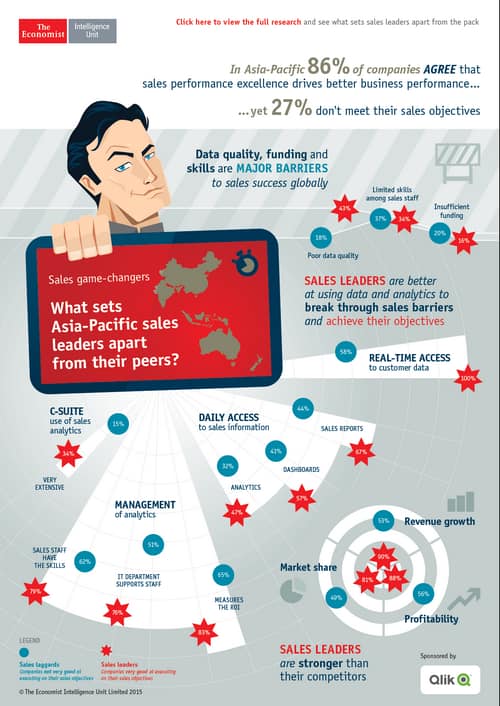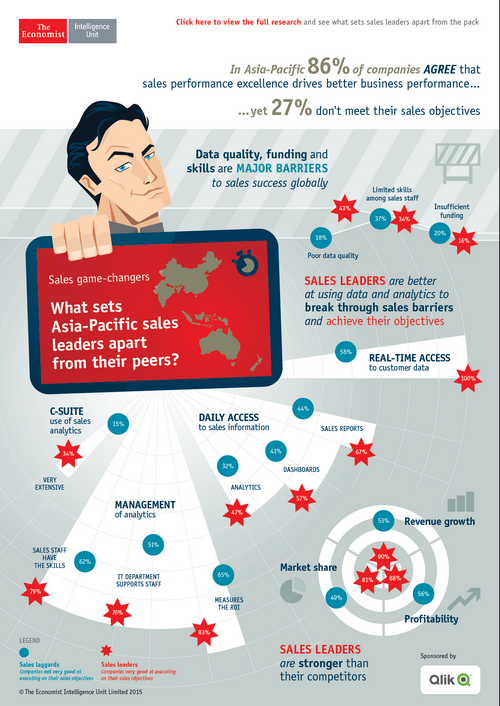Nearly 80 percent of companies indicated that managing sales performance was “somewhat important” or “much more important” than other business objectives, according to a study released by the Economist Intelligence Unit (EIU. The study – which surveyed 550 global sales leaders, nearly half of whom are from APAC geographies, including India – highlighted that sales performance is a near-universal priority for companies; and that greater access to data, frequent use of analytic tools, and the adoption of data at higher levels of the organisation leads to better sales performance. [caption id=“attachment_2427112” align=“alignleft” width=“500”]
 Qlik[/caption] At the same time, however, companies lack a degree of sales confidence with only a quarter of respondents citing they were “very good” at executing on sales objectives. About 97 percent of companies who indicated they were very good at executing on sales objectives had real-time, self-service access to customer or account data. Of those, three in five of these firms said they access sales reports one or more times per day. Insufficient or poor quality data was one of the top barriers to better sales performance, cited by 27 percent of respondents. Companies felt data accuracy (53 percent) and the ability of the analytics platform to integrate with existing systems (38 percent) were the most important features of sales data analytics applications. However, these were also most commonly cited as the main limitations of their current systems – by more than 30 percent of respondents. Around a third of companies who said they were “very good” at executing on sales objectives also reported that sales analytics data was used extensively by their C-level executives, versus 19 percent of other firms. Sales leaders were more likely to see themselves as stronger than the competition in terms of revenue growth, profitability and market share. For example, 42 percent of companies that claimed to be “very good” at executing on sales objectives said they were much stronger than competitors in terms of revenue growth, versus 11 percent of other firms. About three in five (59 percent) of companies overall agreed their sales staff had the skills to take advantage of analytics, increasing to 77 percent of companies that claimed to be “very good” at executing on sales objectives.
Qlik[/caption] At the same time, however, companies lack a degree of sales confidence with only a quarter of respondents citing they were “very good” at executing on sales objectives. About 97 percent of companies who indicated they were very good at executing on sales objectives had real-time, self-service access to customer or account data. Of those, three in five of these firms said they access sales reports one or more times per day. Insufficient or poor quality data was one of the top barriers to better sales performance, cited by 27 percent of respondents. Companies felt data accuracy (53 percent) and the ability of the analytics platform to integrate with existing systems (38 percent) were the most important features of sales data analytics applications. However, these were also most commonly cited as the main limitations of their current systems – by more than 30 percent of respondents. Around a third of companies who said they were “very good” at executing on sales objectives also reported that sales analytics data was used extensively by their C-level executives, versus 19 percent of other firms. Sales leaders were more likely to see themselves as stronger than the competition in terms of revenue growth, profitability and market share. For example, 42 percent of companies that claimed to be “very good” at executing on sales objectives said they were much stronger than competitors in terms of revenue growth, versus 11 percent of other firms. About three in five (59 percent) of companies overall agreed their sales staff had the skills to take advantage of analytics, increasing to 77 percent of companies that claimed to be “very good” at executing on sales objectives.
Data quality, skills seen as top barriers to sales success: Survey
FP Staff
• September 9, 2015, 13:15:11 IST
Greater access to data, frequent use of analytic tools, and the adoption of data at higher levels of the organisation leads to better sales performance.
Advertisement
)
End of Article